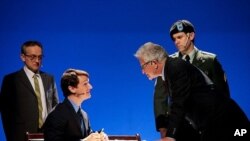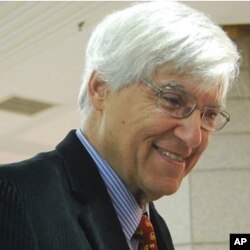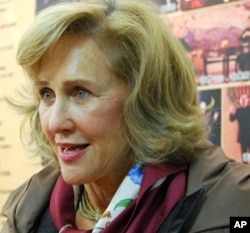Top Secret: The Battle for the Pentagon Papers is not a new play, but it just completed its premiere tour in China.
When should the government exercise its right to protect state secrets? When do a nation's citizens have the right to be told their government has been misleading them? These are some of the big picture issues that are raised by the play that revisits a pivotal episode in U.S. history that occurred in Washington some forty years ago.
Playwright Geoffrey Cowan - a former VOA director and a professor at the University of Southern California - says he first had the idea for the play while he was teaching law students about free speech in the late 1970s.
“This play actually started in a classroom, when I was at UCLA and taught a mass media law class about the First Amendment," he explained. "And, there was this dramatic story in the fight between the press and the government about whether to publish the Pentagon Papers.”
The Pentagon Papers were a highly classified U.S. government study in the 1960's that detailed Washington's decision-making process in the run-up to the Vietnam War. Top Secret focuses on a landmark 1971 lawsuit that pitted the U.S. government against the Washington Post newspaper, which had obtained some of the Pentagon Papers and decided to publish the information, despite a similar injunction against the New York Times for exactly the same thing.
An actress plays Katherine Graham, president of the Washington Post, during the court proceeding during the Guangzhou performance (Photo Jason Xie)
One of the main characters in the play is Katherine Graham, the Washington Post's president at the time. In the play, the newpaper's executive editor, Ben Bradlee, relays her decision to the reporters.
“We publish!” Bradlee informed them
The Los Angeles Theater Works performed Top Secret in Shanghai, Guangzhou and Beijing. Producer Susan Loewenberg spent more than two years working to bring the drama to China.
“It was wonderful the other night in Guangzhou. When Kay Graham makes the decision to publish, they broke out in applause," she said. "And when the court, when the verdict came down from the judge in favor of the Washington Post, they broke out in applause again.”
"Nixon and Kissinger discuss the Pentagon Papers,” during the Guangzhou performance (Photo Jason Xie)
Loewenberg says Chinese audiences were especially interested in seeing how the play poked some fun at U.S. president Richard Nixon and his National Security adviser Henry Kissinger.
“What I think they did not really quite get is we lampoon Kissinger and Nixon, and we go behind the scenes in the Oval Office, because as you know, Nixon taped - as all presidents have since that time - taped those private conversations," she noted. "So we were able to sort of recreate them. But we do lampoon them all.”
Playwright Cowan says one interesting question he answered in one of the post-play discussions in Shanghai was: should there be different free speech rules for developing versus developed countries. He points out that the United States was a developing country in 1791, when it adopted the first Constitutional amendment, that guarantees free speech.
“We were a relatively poor country, against the rich British and the rich French, but we decided this was right for us," Cowan said. "And, secondly, I said let's forget about China and the U.S., and let's think about South Africa - let's take a different country that is struggling with these issues, and do we think that they should have these freedoms or not?”
Washington Post journalists look through the Pentagon Papers for the first time, during the Guangzhou performance (Photo Jason Xie)
The play centers around a specific event in recent American history, but raises larger themes that could have resonance in China, where the government is seen as secretive. Cowan says he hopes audience members will draw their own conclusions.
“I loved the idea of the play being in China, because these themes are so important to people in China," Cowan said. "This is a country that is struggling with its own institutional base and I think they may see something here that may or may not have relevance to them, but that they will find interesting and gripping.”
At a recent performance at Peking University, one 26-year-old - who refused to give her name - says she was most impressed by the courage shown by the journalists at the time.
She says she thinks the themes raised by the play are universal and are something China can learn from.
Another audience member, software engineer Wang, 29, says he felt Katherine Graham made a brave decision to publish the Pentagon Papers.
Wang says the play shows that American people can express their views freely and can take part in what he sees as an ongoing debate between the U.S. Government and media on how to define freedom of the press.
The Top Secret audience members in Shanghai and Beijing took part in post-performance discussions, although similar talks were canceled at Peking University and at Sun Yat Sen University in Guangzhou. At Peking University, authorities say they canceled the discussion because they wanted to avoid any occurrences that were outside the scope of the performance.






